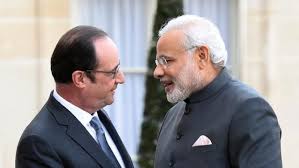As French President Francois Hollande hits the diplomatic circuit, beating the drum in Washington and elsewhere for a coordinated onslaught on the Islamic State of Iraq and Syria (ISIS), there’s speculation whether India could be called upon to play a role. Indian diplomats believe that Hollande may convey such a request if he does accept the invitation to be chief guest at the Republic Day parade next January. What would India’s answer be?
Indian diplomats say what would emerge from India would be a generalised statement of support in the war against terrorism and intensified cooperation in intelligence sharing. India’s hands are tied by the fact that 39 of its citizens remain in ISIS hands, and any hope of them coming back alive depends on India not joining the “bash ISIS” coalition.
The point also that although some Indians are fighting alongside ISIS and there are reports of 150 others at home being “tracked” for what are seen as online jihadi activities, the ISIS is presently seen as less threatening than the activities of jihadi groups operating from Pakistan.
A senior Indian diplomat with long experience of the Gulf says that “ISIS remains overwhelmingly an Arab force on the ground, consisting mainly of Iraqis in Iraq and Iraqis and Syrians in Syria. Syria also has other Arabs (mainly from Saudi Arabia and to lesser extent from North Africa), with only a token presence from Europe, Central and South Asia.”
In his view, there is only one instance where the ISIS has gone outside the Iraq-Syria region (Levant), and that is Libya where it is competing with the Al Qaida affiliated Al-Murabitoun of Mukhtar Belmokhtar (and some other groups including the so called secular ones around Gen Haftar).
“In other places,” he notes, “existing local jihadi groups or their splinter groups have declared their allegiance to the Caliph Abu Bakr al-Baghdadi. ISIS Central itself has not penetrated into those areas. The latter include splinter groups from the Tehrik-e-Taliban Pakistan, Afghan Taliban and AQAP, and the mainstream Al Shabaab, Boko Haram and the Sinai-based Beit al Maqdis, said to be responsible for the bombing of the Russian plane.”
A case in point is Afghanistan, where in January this year, former Tehreek-e-Taliban (TTP) commander Hafiz Saeed Khan was anointed head of the Islamic State Khurasan, that name describing the territories of Afghanistan, Pakistan, India and Bangladesh. Reports say he celebrated his ‘coronation’ by beheading a captured Pakistani soldier. There have been unconfirmed reports about Saeed Khan being killed in a US drone strike in July, but even so clashes between ISIS affiliated factions and the Taliban have been reported.
Since the ISIS is a breakaway group from Al Qaida, hostility to its former “parent” and those affiliated to it is apparent. A recent statement in the ISIS mouthpiece Dabiq is significant: “In India, they (Al Qaeda) are the allies of the nationalist Kashmir factions whose advances and withdrawals are only by the order of the apostate Pakistani Army.”
By implication, this would include the Lashkar-e-Tayyaba and other jihadi groups active in Kashmir that are supported, armed and trained by the Pakistan Army.
The sources warn that evidence of ISIS interest or activity in India is thin on the ground, and it has not engaged in any spectacular act of terrorism in this country. ISIS is an Arab problem that can only be solved by Arab nations working together. But there is no evidence to show that the major players in Syria and Iraq today are driven by common concerns regarding ISIS. India’s interests are better served by giving that region wide berth.
ibnlive.com



